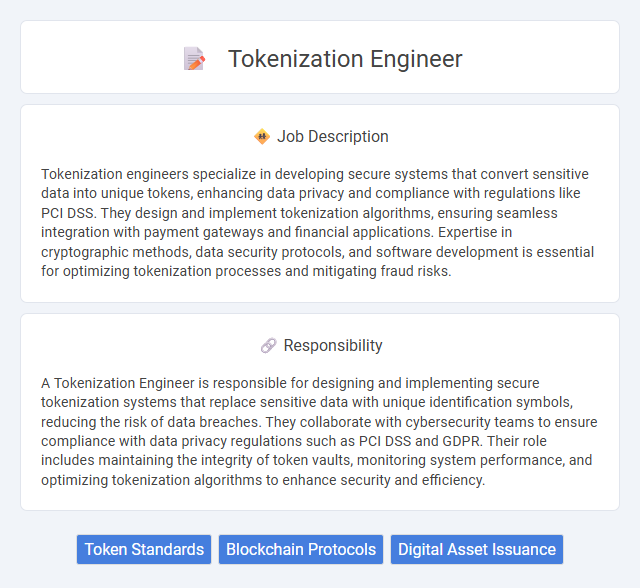
Tokenization engineers specialize in developing secure systems that convert sensitive data into unique tokens, enhancing data privacy and compliance with regulations like PCI DSS. They design and implement tokenization algorithms, ensuring seamless integration with payment gateways and financial applications. Expertise in cryptographic methods, data security protocols, and software development is essential for optimizing tokenization processes and mitigating fraud risks.
Individuals with strong analytical skills and attention to detail are likely to excel as tokenization engineers, as the role involves complex data transformation and security protocols. Candidates comfortable with programming languages and blockchain technology may find this position more suitable due to its technical demands. Those who prefer routine tasks or lack interest in evolving digital security landscapes might find the job less aligned with their strengths and preferences.
Qualification
A Tokenization Engineer requires expertise in secure data processing, cryptographic algorithms, and software development with languages such as Python, Java, or C++. Proficiency in PCI DSS compliance, data security standards, and experience with payment tokenization systems are essential. Strong analytical skills, problem-solving abilities, and familiarity with cloud security frameworks enhance performance in designing robust tokenization solutions.
Responsibility
A Tokenization Engineer is responsible for designing and implementing secure tokenization systems that replace sensitive data with unique identification symbols, reducing the risk of data breaches. They collaborate with cybersecurity teams to ensure compliance with data privacy regulations such as PCI DSS and GDPR. Their role includes maintaining the integrity of token vaults, monitoring system performance, and optimizing tokenization algorithms to enhance security and efficiency.
Benefit
A Tokenization Engineer likely offers substantial benefits by enhancing data security through converting sensitive information into secure tokens, reducing the risk of data breaches. This role probably improves compliance with industry regulations such as PCI DSS, thereby safeguarding organizational reputation. Furthermore, the engineer's expertise can lead to streamlined payment processes and increased customer trust, potentially boosting overall business efficiency.
Challenge
Tokenization engineers likely face challenges in ensuring data security while maintaining system efficiency during tokenization processes. They probably need to address complex encryption algorithms and constantly adapt to evolving regulatory requirements. It is also probable that troubleshooting integration issues with existing IT infrastructure demands significant problem-solving skills.
Career Advancement
Tokenization engineers specialize in securing sensitive data by converting it into non-sensitive tokens, critical for industries like finance and healthcare. Advancing in this career often involves gaining expertise in cryptographic protocols, compliance standards such as PCI DSS, and mastering cloud security platforms like AWS or Azure. Career progression can lead to roles such as senior security architect, data protection officer, or cybersecurity manager, with opportunities expanding in the evolving data privacy landscape.
Key Terms
Token Standards
Tokenization engineers specialize in designing and implementing token standards such as ERC-20, ERC-721, and ERC-1155 to facilitate secure and interoperable digital asset management on blockchain platforms. They ensure compliance with protocols that define token behavior, metadata, and transferability, optimizing smart contracts for performance and security. Mastery of token standards enables seamless integration with decentralized applications (dApps) and enhances the scalability of blockchain ecosystems.
Blockchain Protocols
Tokenization engineers specialize in developing and implementing blockchain protocols that convert real-world assets into digital tokens, enabling secure ownership transfer and enhanced liquidity. Expertise in cryptographic algorithms, smart contract development frameworks such as Ethereum or Hyperledger, and consensus mechanisms like Proof of Stake or Delegated Proof of Stake is essential. Their role includes designing scalable, compliant token standards (e.g., ERC-20, ERC-721) to facilitate decentralized finance (DeFi) applications and secure asset tokenization workflows.
Digital Asset Issuance
Tokenization engineers specializing in digital asset issuance design and implement secure blockchain protocols to convert real-world assets into digital tokens. Their expertise includes smart contract development, compliance with regulatory frameworks, and integration with decentralized finance (DeFi) platforms to ensure seamless asset liquidity and transferability. Proficiency in cryptographic algorithms, distributed ledger technology, and Ethereum or other blockchain networks is essential for efficient and scalable token issuance.
 kuljobs.com
kuljobs.com